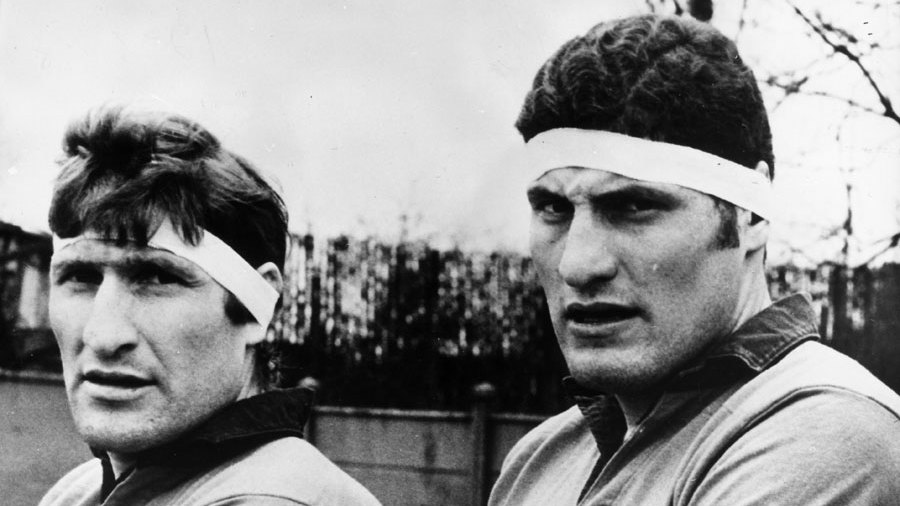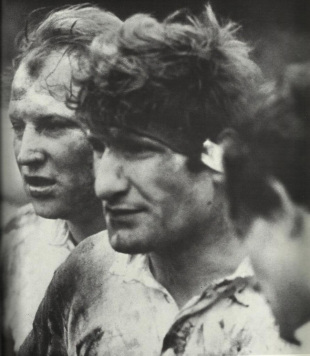|
Walter Spanghero
'A match that doesn't hurt you is a match wasted'
Huw Richards
July 28, 2014

Walter Spanghero, on the left, with his brother Claude - team-mates but their relationship was often tense © Getty Images
Enlarge
To be called tough by Colin Meads is a bit like Usain Bolt saying you are quick or Israel Folau praising your ability to switch seamlessly between handling codes of football. So it gives some idea of the quality of Walter Spanghero, the French forward who won his first cap 50 years ago this month. As a farmer's son he was, as Midi Olympique's writers point out in their centenary history of the French team, naturally appealing to an increasingly urban nation which still cherished its rural heritage. He also reflected another strong tendency in French sport, the son of immigrants who becomes a national symbol. His father had been a stone mason in his native Italy before escaping fascism and hunger. But he was vastly more than a sum of French archetypes. As a 20-year-old forward he made his international bow in perhaps the toughest possible circumstances - away to South Africa, at Springs. The French team was under strength, deprived of the brilliant Boniface brothers among their backs because of an off-field incident before the tour. South Africa was not much changed from the team which a few weeks earlier had beaten Wales - which had shared the 1964 Five Nations championship with Scotland - by a resounding 24-3. Spanghero had been a late choice for the tour, when Toulouse No.8 Jean Fabre dropped out. Fabre did not play for France again, but the newcomer would be around for a decade. He started by playing his way into the Test team with brilliant performances against Griqualand West and Western Province. He was thrust into the second row alongside Benoit Dauga, a 22-year-old winning his sixth cap, beginning a long if not always happy association.
It was, Richard Escot has written, "not so much a match as a collision". France won the battle up front, confining the Boks to their own territory for long periods, and took control with a superb try by wing Christian Darrouy, who charged 50 metres up the touchline to score just before half-time. The Boks had a last minute penalty chance but missed, leaving France winners by 8-6. Like Meads, Spanghero could play either lock or No.8, although unlike the New Zealander he oscillated between the two positions for his whole career, winning 23 caps in each. He also won five caps on the flank, most memorably in Cardiff in 1968 when a late injury to Jean Salut led to a wholesale reshuffle of the French pack which proved entirely successful as they completed their first ever Grand Slam. His quality was testified to by the greatest players in his two main positions. Meads recalled of the King Country v France match in 1968 that "he gave me a bath in the lineouts that day, or at least he made it difficult" and more generally that the Frenchman was "a fair player who went for the ball all the time, springheeled on the jump and as tough as teak". Mervyn Davies, in his first autobiography, picked him at lock in his notional World XV to play Wales, recalling him as "a beautiful runner and ball player (with the biggest hands I have ever seen) who epitomised all that was best in French forward play". When Merv chose again in his second book with 30 years' more players to pick from, Spanghero had given way to John Eales at lock - no disgrace, to put it mildly - but was still named among the best runners-up to Wayne Shelford for the No.8 slot. Spanghero was wont to say that "a match that doesn't hurt you is a match wasted". A second trip to South Africa in 1967 was to earn him the nickname 'Iron Man' from appreciative Bok fans. That commitment was one of the qualities which made him a natural choice as French captain in 1969 with the team in disarray after 10 consecutive defeats. Among those advocating his selection was the president of the Republic, Georges Pompidou. The losing run was broken in an 11-11 draw against Wales mostly now remembered for Phil Bennett's debut as the first ever Welsh replacement. Yet by the following season, 1970, he was out of the team. Aware of the tension between Spanghero and Dauga, coach Guy Basquet decided that he could not accommodate both and chose Dauga. Spanghero was to complain that Basquet had "made a laughing stock of him". It was not the last falling out of his career - he has had a famously stormy relationship with his younger brother Claude, a colleague in the French pack on seven occasions. Restored in 1971 he was captain again by the end of the season, a position he held until the end of his international career in 1973. There were no championships to celebrate, but he did lead the French to victory over the All Blacks in early 1973. There was still one serious gap left in his list of honours - a national championship. His emergence as a serious force in the French game coincided, most uncoincidentally, with Narbonne's rise to prominence in the 1960s. Champions in 1936, they had done little since, but made it to the semi-finals in 1964 and remained contenders for the rest of a club career encompassing more than 350 games.

© Getty Images
Enlarge
After further semi-finals in 1968 and 1972 they made it to the final in 1974, a derby clash with Beziers - less than 20 miles down the road, but the dominant force of the decade. A Narbonne side led by Walter and including not only Claude but yet another brother, Jean-Marie, was within seconds of victory when Beziers outside-half Henri Cabrol landed what one French website aptly labels 'un drop assassin' to steal the title. There were other honours - Midi Olympique twice rated him, in 1966 and 1972, the best player in the French championship. And Narbonne won the Challenge Yves du Manoir, at the time French rugby's answer to the FA Cup, in 1968, 1973 and 1974. Each victorious team contained three Spanghero brothers - Walter, Claude and Jean-Michel played the last two while Jean-Michel and the oldest of the brotherhood, Laurent played alongside Walter in 1968. But no Bouclier de Brennus. There were further semi-finals in 1975 and 1976, but by the time Narbonne finally claimed the venerable shield under Claude's leadership in 1979, Walter had moved on for a career coda in Toulouse. That move brought one more semi-final disappointment, in 1978, and the foundations of a long career as a prominent citizen. In 2002 he was elected to the city council as an independent. While a friend of Jacques Chirac and generally regarded as a natural Gaulliste, he has also voted for left-wing candidates. Anyone walking towards the centre of the city from Toulouse's Matabiau station was likely to pass a large vehicle hire depot bearing the family name, part of a business empire which also incorporated the renowned Table de Spanghero food label. It was this last brought him considerable pain when it was implicated in 2013 in the horsemeat scandal. It was no longer under family control, but Walter spoke of his embarrassment, and the feeling that he was being pointed at and talked about in the street. He almost certainly was, but it is a fair bet that most of the pointing and talking picked him out simply as one of France's great rugby heroes. © ESPN Sports Media Ltd
| |||||||||||||||
Live Sports
Communication error please reload the page.
-
Football
-
Cricket
-
Rugby
-
- Days
- Hrs
- Mins
- Secs
F1 - Abu Dhabi GP
Abu Dhabi Grand Prix December 11-131. Max Verstappen ()
2. Valtteri Bottas (Mercedes)
3. Lewis Hamilton (Mercedes)
4. Alexander Albon ()
5. Lando Norris ()
6. Carlos Sainz Jr ()
-
ESPNOtherLive >>
Snooker - China Open
Tennis - Miami Open

